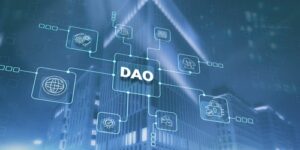The rise of Web3 and the metaverse is causing a lot of headaches for the legal community. New concepts such as digital assets, virtual currency and tokenisation pose significant challenges to lawyers worldwide. This is also the case for Decentralised Autonomous Organisations (DAOs).
What are Decentralised Autonomous Organisations (DAOs)?
DAO stands for Decentralised Autonomous Organisation. This is a collective, blockchain-driven organisation whose members share a common goal. DAOs are virtual organisations where, based on collective decision-making, either resources are managed collectively or common goals are pursued by DAO members. A DAO is an organisation that operates on the basis of smart contracts on a decentralised blockchain platform, such as Ethereum.
In a DAO, decision-making and operational processes are automated through codes, so no central authority or intermediary is needed to manage the organisation. Decisions are made by consensus where members of the DAO have voting rights, which they can exercise through tokens. This means that every member has a voice in the organisation’s decision-making process. The rules and governance structure of a DAO are entirely determined by codes and agreements set out in the blockchain protocol.
A key feature of DAOs is that they are open and transparent. Data and transactions within a DAO are stored on the blockchain, meaning they are publicly available for verification and audit. This promotes trust and reduces reliance on intermediaries.

Economic importance of DAOs
In a January 2023 report, the World Economic Forum stated that the total value of assets encrypted in DAOs on blockchain would increase by a factor of 40 by 2021, from $380 million to $16 billion. The economic importance of DAOs should therefore not be underestimated. DAOs have therefore become an important new mechanism for managing and allocating capital or other valuable digital assets.
This is not so surprising. DAOs have several economic benefits and can have a significant impact on different aspects of the economy. Important economic benefits of DAOs include decentralisation of power, independence from intermediaries, transparency and borderless participation:
– DAOs offer the opportunity to decentralise power and spread decision-making across a wider group of participants. This can lead to more inclusive and democratic decision-making processes, where individuals can participate directly in the governance of a project or organisation. This allows participants to feel more involved and have a greater influence on the economic activities of the DAO.
– DAOs use smart contracts and blockchain technology, allowing direct peer-to-peer interactions without the involvement of traditional intermediaries. This can reduce or even eliminate the need for intermediaries, such as financial institutions or platforms. The result is lower transaction costs and a more efficient economic system.
– DAOs use transparent and immutable blockchain technology, enabling a higher level of trust and transparency. Users can track and verify activities and decisions within a DAO. This can help build trust between participants, which is beneficial for economic interactions and cooperation.
– DAOs have the potential to enable global participation without geographical limitations. People from all over the world can participate in a DAO and contribute to its activities. This opens up new opportunities for cooperation, innovation and economic growth.
And what about the legal status of DAOs?
As with all other new technological evolutions, DAOs also raise important legal issues. Since DAOs are decentralised and blockchain-based, they present a new challenge to traditional legal regulation. The lack of a central authority or responsible entity makes it difficult to categorise DAOs within existing legal structures. Regulations applicable to traditional companies and organisations are often not appropriate for DAOs.
The lack of legal status of DAOs raises numerous questions, such as whether DAOs can enter into contracts and develop profitable activities. Another important question is whether the lack of legal personality of DAOs gives rise to personal liability of members. The same applies to the tax status of DAOs.
But here too, the legal community seems to be slowly but surely adapting to the new concept of DAOs. The Coalition of Automated Legal Applications, a global blockchain think tank, has already developed regulatory frameworks for legal recognition of DAOs. And meanwhile, several governments have also taken the step towards legal recognition of DAOs. Malta, for instance, already granted legal personality to DAOs in 2018. And the US states of Wyoming, Tennessee and Vermont have decided to include DAOs in existing corporate structures. Also, the US Securities and Exchange Commission, the US government agency that oversees securities markets in the United States, has decided that tokens issued for investment purposes should be classified as securities.
In other words, work in progress.
More information?
Contact us via infotax@bloom-law.be
#metaverse #DAOs #blockchain

